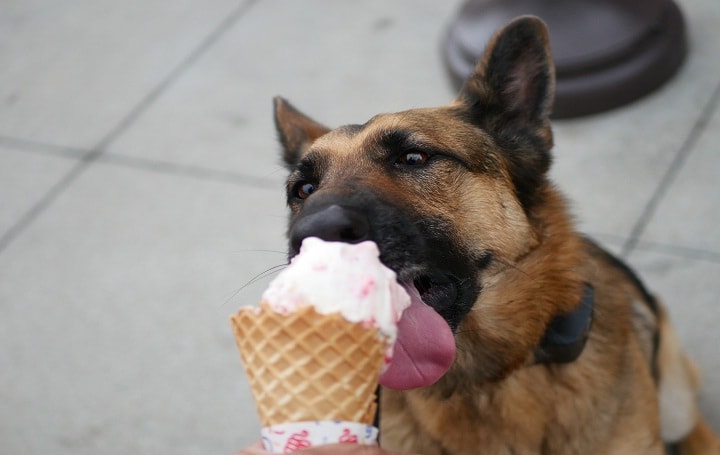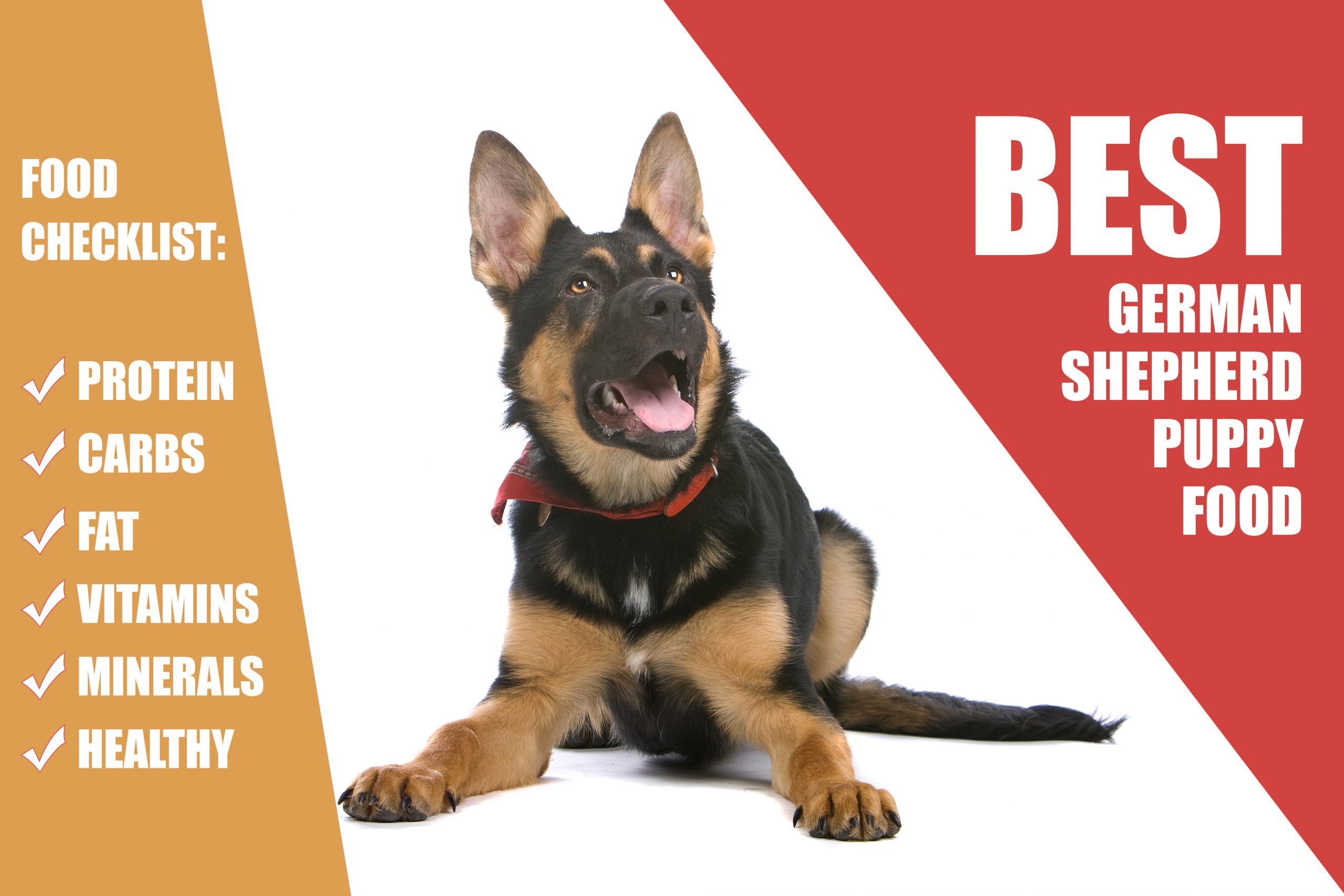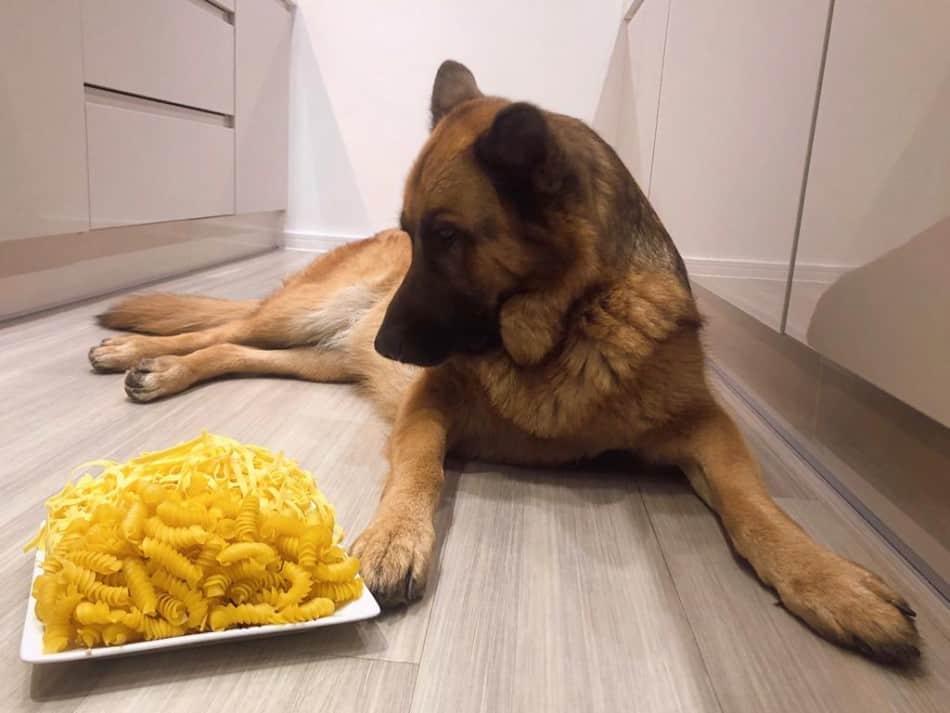How Much Food To Feed A 8
You should feed your 8-month-old German Shepherd Dog puppy 4.1 cups of dry dog food every day.
Ration this food into two or three separate portions and give it to your German Shepherd Dog puppy over the day.
Our recommendation on how much food you should feed your 8-month-old German Shepherd Dog puppy assumes that the weight of your German Shepherd Dog is typical for its age.
The typical weight for a 8-month-old German Shepherd Dog puppy is 56.4 lbs .
Our recommendation on how much food to feed your German Shepherd Dog also assumes that you feed your German Shepherd Dog dog food that has an average calorie density .
Use our German Shepherd Dog food calculator to calculate a more accurate estimation of how much food to feed your German Shepherd Dog.
German Shepherd Puppy Feeding Guidelines
Here are some general German Shepherd puppy feeding guidelines that may be helpful to consider as you plan your puppys menu:
- Puppies typically need to eat more than adult dogs.
- The puppy diet is usually higher in fat and protein than the adult dog diet.
- A good puppy food will always meet these two criteria: it is formulated for large breed puppies AND it offers complete and balanced nutrition.
- Do not provide extra vitamins and minerals unless your veterinarian advises otherwise.
- Puppies generally eat at least three times per day, whereas adult dogs may eat twice or even just once per day.
- Puppies always need access to plenty of fresh water during and in between meals.
- A common age to switch GSD puppies from puppy food to adult dog food is 12 months.
German Shepherd Feeding Frequency
Much like the feeding amounts, your German Shepherds meal frequency will vary depending on its age. Heres how many times you should feed your German Shepherd daily:
- During the weaning process or at 8 weeks old and below: 4 daily feedings spaced at equal intervals.
- 8 weeks to 9 months old: 3 daily feedings spaced at equal intervals.
- 9 months to 12 months old: Transition to two daily feedings, once in the morning and the other in the evening, and about 12 hours apart.
- 12 months old above: Two daily feedings unless advised a different schedule by the veterinarian.
For evening meals, it would be best if you feed your German Shepherd a few hours before bedtime. That way, youll prevent your dog from having excess energy and needing to go on toilet breaks during the night.
Also Check: 6 Month Old German Shepherd For Sale
Foods Your German Shepherd Should Avoid
Given that different varieties of foods are available in our homes, either manufactured or homemade, they all have varying effects on your canine friends when ingested.
Well use the traffic lights colors to categorize the foods your German Shepherd should not eat based on the severity of their effects. Heres what I mean by that:
- GREEN will represent foods that arent poisonous to your pooch but cause mild effects once consumed. These effects include mild diarrhea, irritation, and vomiting. Additionally, your German Shepherd should only eat these foods in moderation since they have long-term adverse side effects if eaten too often.
- YELLOW will be the foods that cause moderate to severe effects once ingested by your furry canine friend. They may cause severe stomach upsets, difficulty breathing, vomiting, and diarrhea. If your dog consumes these foods, you should immediately consult a vet.
- RED will show the highly toxic foods that your pup should never consume. These foods have high toxicity levels, and once eaten, they might put your Shepherds life in danger.
In the ideal world, you wouldnt give your German Shepherd any of these foods because theyre not among their natural diet.
But lets find out which foods belong in each color-coded category.
German Shepherd Feeding Guide: Adult Years

Once your German Shepherd has ended his puppy stage and transitioned into adulthood, hes ready to eat a balanced adult diet.
Adult dog food will have a different ratio of calcium, protein, phosphorus, and other nutrients than puppy food does.
Feeding an adult dog a puppy formula can cause obesity as well as put too much strain on kidneys and other vital organs. Long term use of inappropriate food for an adult dog can have catastrophic consequences.
That said, there is no need to panic if your adult GSD eats a bowl of puppy food now and then.
Adult German Shepherds should be fed twice a day. They can get by on once per day, but its always better to split daily caloric intake between smaller meals instead of feeding it all at once.
Again, bloat is a real problem for large breed dogs, and large meals seem to be a big cause of this.
If youre not home for twice-daily feedings, you can use an automatic feeder. These will dispense the proper amount of food at set times each day so your dog isnt left waiting for meals.
Throughout the years, Ive fed a number of different high-quality dog foods to my German Shepherds.
One of my consistent go-tos is Royal Canin Adult Breed German Shepherd dry dog food. I feed my adult dogs this particular blend for a number of reasons.
In addition, this blend also uses optimal levels of omega-6 and omega-3 fatty acids to make a GSDs coat pop, so to speak. You really can see the difference.
Read Also: How Big Should A German Shepherd Be At 4 Months
What To Feed My German Shepherd Puppy
German Shepherds are big dogs, and they have a hearty appetite. Although dogs are not obligate carnivores by nature, they thrive on a protein-rich diet. Ideally, most of the protein you feed your GSD will come from animal and meat sources rather than plant sources. Feed a minimum of 22% protein, although we would aim for 25% protein at the very least.
Read Also: German Shepherd Puppy Raw Diet Plan
German Shepherd Puppy Feeding Guide
Knowing how much to feed a German Shepherd puppy helps you to keep track of their growth and habits. Its good to chart how much youre feeding them so that you can monitor their weight gain, growth, and appetite changes.
Follow this chart as a guide for how much food a German Shepherd puppy usually eats.
Recommended Reading: What Age Do German Shepherds Ears Stand Up
Working Towards A Sustainable Future
Our belief that pets make our world better inspires and gives life to our purpose of making a better A BETTER WORLD FOR PETS
- Ingredients
-
Chicken by-product meal, wheat gluten, corn, oat groats, brewers rice, corn gluten meal, chicken fat, brewers rice flour, brown rice, natural flavors, dried plain beet pulp, fish oil, sodium silico aluminate, monocalcium phosphate, vegetable oil, calcium carbonate, pea fiber, potassium chloride, psyllium seed husk, L-lysine, salt, fructooligosaccharides, sodium tripolyphosphate, vitamins , hydrolyzed yeast , choline chloride, taurine, DL-methionine, glucosamine hydrochloride, trace minerals , marigold extract , Yucca schidigera extract, chondroitin sulfate, carotene, rosemary extract, preserved with mixed tocopherols and citric acid.
Calorie Content
This diet contains 3639 kilocalories of metabolizable energy per kilogram or 331 kilocalories ME per cup on an as fed basis .
- Guaranteed Analysis
Diamond Naturals Beef Meal & Rice Formula
Top 5 Ingredients: Beef Meal, Grain Sorghum, Ground White Rice, Dried Yeast, Egg Product
The Diamond Naturals Beef Meal & Rice Formula is a wonderful choice for your German Shepherd who is no longer a puppy.
This mix is enhanced with superfoods and probiotics to assist with overall health and development, as well as antioxidants, omega fatty acids for your furry friends coat and skin and nurturing minerals.
It includes protein, such as beef and fish, as well as fruit and vegetables such as blueberries, peas, kale and coconut. There has been some indication that this food is not suited to super picky eaters, however this dry food is generally a good choice for German Shepherds.
Read Also: What Is The Average Weight Of A German Shepherd
Best Diet For German Shepherds
German Shepherds grow to a large size dog breed between 60 to 90 pounds that is well muscled, slightly tapered, angular and longer than deep chested when fed a breed appropriate diet. Adult German Shepherds require 1,300 to 1,600 calories per day of high quality dog food for senior or less active dogs, and from 1,700 to 2,400 calories daily for active or working dogs.
If choosing a dry kibble diet, select a a quality formula like these Recommended Dog Food Brands with protein level around 24% and fat levels around 14%. Shepherds require quality protein which should come from a named meat source. Most premium kibble formulas work and Raw Dog Food is even better. Grain free kibble is another option but is very calorie dense and high in protein. We mention this with caution as some German shepherds seem to have difficulty tolerating grain free kibble and end up with soft and runny stool. For excellent insight on choosing a quality kibble to feed your German Shepherd, take a look at our Feeding Dry Dog Food section.
Food & German Shepherd Health: Why Feed Homemade
Despite being wonderful dogs, German Shepherds are notorious for developing food allergies and food hypersensitivities. A study published in BMC Veterinary Research Journal found that German Shepherds are at a high risk of developing cutaneous adverse food reactions , or in simpler terms, dog food allergies.1
CAFR can be responsible for many skin allergy issues like atopic dermatitis. Chronic allergic reactions are accompanied by excessive scratching, itching, and biting.2 Eventually, this could lead to secondary bacterial or yeast infections in your GSD. Unfortunately, a lot of German Shepherd allergies arise from commercial dog food. Kibble ingredients like protein sources, high levels of animal fat, preservatives, meat by-products, food coloring, grains, and fillers contribute to more allergies in this breed.
GSDs are predisposed to degenerative myelopathy, elbow and hip dysplasia, and osteoarthritis.3,4,5,6 Because German Shepherds are prone to these skeletal and bone problems, its vital for GSDs to maintain a healthy weight. An obese German Shepherd may have an increased risk of developing osteoarthritis and other joint disorders because the excess weight puts more strain on their joints, bone structure, and back . It could also potentially lead to degenerative myelopathy in GSDs.
Remember that even grain-free kibbles with high-quality ingredients can have high levels of starchy carbs and bad carbs that contribute to the pet obesity epidemic.
Also Check: How Big Is An 8 Week Old German Shepherd
German Shepherd Homemade Food Tips
Once you pick a recipe for your GSD or GSD puppy, its time to prepare it. Here are a few tips to keep in mind.
Best Homemade Food For German Shepherd

The best homemade food for GSD is a balanced diet that provides the optimal amount of nutrients for proper function in your pet while considering your dogs nutritional goals and health. We highly recommend Nom Nom as the best fresh home-cooked food for adult and puppy GSDs.
Dont feel like cooking for your GSD? Here is the most comprehensive guide to help you find the best commercial kibble for your GSD.
Chapter 2
Recipes & how-to cook guide
You May Like: Healthy Diet For German Shepherd
Month Old German Shepherd Puppy Weight
When your GS puppy is 2 months old, you can expect him or her to weigh between 16 and 20 pounds, depending on the sex of the puppy. Females will always be a little lower on the scale than their male counterparts.
They are bigger dogs and do gain weight quicker than other breeds, but you still want to watch for signs of gaining too much too quickly or being underweight.
Avoiding Underfeeding & Overfeeding
A German Shepherd is a large breed dog and should never be skinny. Although the GSD breed is not necessarily prone to being overweight, this is always a danger if you feed your dog too much, or if he doesnt get enough exercise.
Always ensure that you measure your dogs food, stick to the appropriate amounts, and be careful if you give additional treats and extra food. If you give your dog treats, be sure to remove these calories and fat from their daily food intake. Even though the GSD is a large breed dog, they are still smaller than humans, so it can be difficult to comprehend exactly how much extra food you are giving.
Read Also: How Many Miles Can A German Shepherd Run
Is Raw Food Safe For German Shepherd Dogs
Sam Shephard is an experienced German Shepherd owner and has learned throughout the years how to optimize the breed’s health and wellness.
Honestly, German Shepherds eat a little bit of everything.
Humans have known for quite some time that raw food can be among the healthiest that we can eat. In some circumstances , the same can go for dogs. Keep in mind that a German Shepherd has different dietary needs than a human.
To be clear, our dogs mostly get kibble 5-6 days a week. When we add non-processed food, it’s mostly self-cooked meat that is not necessarily raw.
Raw food additions to the menu are rather small and parasite-safe. Decent kibble allows you to balance the nutritional intake more easily, so if you don’t have the time to research and experiment safely, just go with time-tested formulas. If you want to try raw dog food for your German Shepherd, talk to your vet first. Don’t risk your dog’s health by recklessly trying something new because it sounds healthy.
In this article, were going to outline the hows and why’s of feeding a German Shepherd a raw food diet. After reading this article youll be able to make a well-informed decision about whether or not youre going to take your Shepherd onto a raw food diet. Keep in mind that we’ll focus more on the raw food positives.
Remember
What To Be Given To My Puppy After 4 Months
The food should be reduced to thrice a day, after 4-6 months of age.
The packaging of quality commercial dog food will detail the appropriate suggested amount of food for the puppy, depending on its age and weight.
Fresh food, such as meat, fish, or vegetables, can be mixed with the commercial dry feed. Beware of forbidden foods for dogs.
Some people ask about a raw diet for a German shepherd puppy, but we recommend these such foods should always be cooked and never given to a dog raw.
Avoid chicken, rabbit, and fish bones, as they can shatter and harm a dogs teeth.
Human food contains salt, sugar, and seasoning contents which are very harmful to a dogs health. Besides, if you do offer your dog your food, it will pester you during meals.
Read Also: What Are The 5 Types Of German Shepherds
Week Old German Shepherd
At 6 weeks old, your job as a new owner is to make sure that your puppy is receiving the same level of nutrition that they were getting from their mothers milk.
Ideally, your puppy should still be nursing from their mother, because most foods are going to have a hard time replacing the needed micro and macronutrients, along with the natural antibodies that are found inside of the mothers milk.
Donât Miss: German Shepherd Puppy Biting Hard
German Shepherd Feeding Guide For Seniors
You will need to modify your German Shepherds diet when he changes from adult life stage to senior. Older German Shepherds have lower energy needs.
They will begin to have less physical activity and move slower, and so they will require fewer calories each day. You should increase in fiber amount in their diet because digestion tends to slow down in seniors
There are some commercially sold dog foods that are already adjusted for seniors. If you prepare your own dog food, you will need to reduce the calories primarily through the carbs.
Senior German Shepherds still require proper nutrition, especially for their bones and joints.
When it comes to treats, senior dogs should have healthy ones like whole-food treats such as apple slices or carrots.
Also Check: How Old Is A German Shepherd In Human Years
What Human Foods Can A German Shepherd Puppy Eat
Sometimes, your German Shepherd puppy deserves to be given a treat, and certain human foods are great options. There are proteins, veggies, fruits, carbs, and nuts eaten by humans that can you feed your puppy.
Proteins such as chicken, turkey, fish, eggs, and beef are great sources to help your puppy gain lean muscle and become strong.
Safe fruits for your puppy include blueberries, apples, strawberries, watermelon, coconut, bananas, and mangos. They are packed with minerals, vitamins, and antioxidants.
Safe veggies for your German Shepherd puppy include green peas, carrots, bell peppers, broccoli, and cucumber. Safe nuts for your puppy are peanuts but they should be plain. Safe carbs for your puppy include rice and sweet potatoes because they are easily digestible.
Is Pedigree Good For German Shepherd

If your pet German Shepherd is an active one, you can go for this pack of dog food by Pedigree that is meant for active large dog breeds. Being apt for active dogs, this food can be used to feed most of the German Shepherds that are kept for security purposes and undergo training sessions regularly.
Read Also: How To Tell If German Shepherd Is Purebred